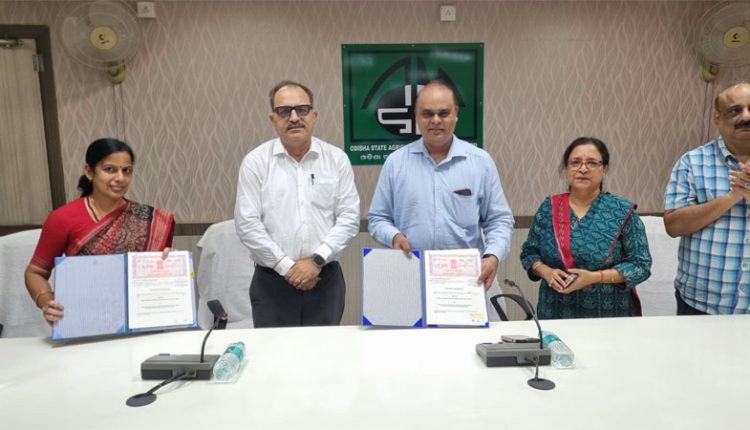Bubaneswar: Cooperation Department, Government of Odisha has initiated a project on “Agri Marketing Network” linking all 66 Regulated Market Committees (RMCs) of the State, 43 Krushak Bazars, 76 Municipal markets including 800 FPOs and Women SHGs. Odisha State Agricultural Marketing Board (OSAM Board) on behalf of the Department today entered into an agreement with International Crops Research Institute for the Semi-Arid Tropics (ICRISAT), Hyderabad to facilitate implementation of the project, and a Memorandum of Agreement was signed between the two organizations. The MOA was signed in presence of Sanjeeb kumar Chadha,Principal Secretary Cooperation.
Among others Additional Secretary Subhra Mohanty , GM OSAM Board Dharitri Mishra , Sujay Kar,Joint CEO ORMAS . Aravazhi Selvaraj CEO & Cluster leader ICRISAT , Sangram Rout Deputy Secretary and other departmental Officers were present during the signing in ceremony held in the Conference Hall of OSAM Board today.
Speaking on the occasion Principal Secretary Mr Chadha told that the Fruits and Vegetables Sector in Odisha encounters many challenges which impact almost all stakeholders linked with the value chain from production at the level of farmers to marketing at the level of end consumer.High variation in quality of products, lack of structured and scientific processing infrastructure, lack of systematic and updated supply chain infrastructureand exploitative role by middle men are some of the major challenges which need immediate intervention. A sustainable solution needs to bring the critical value chain players to a single platform addressing the major issues at each level through technological interventions to benefit the smallfarmers.
To address these issues, ICRISAT has signed the agreement on behalf of one of its wing, the Agri-Business Incubator at International Crops Research Institute for the Semi-Arid Tropics (ICRISAT-ABI). ICRISAT is an ‘International Organization’, notified under the United Nations Privileges & Immunities Act-1947 and in The Extraordinary Gazette of India by the Ministry of External Affairs, Government of India.
The project aims at transforming Agri-Marketing through operationaliseing RMCs, developing market linkages and empowering farmers through supply chain management in Odisha.The objectives of the MoA include study for developing entity level integration & development of implementation plan, handholding and mentoring for effectively operationalizing primary processing centres/pack houses in RMC areas, establishing market linkages for Women led SHGs and development of market information system/MIS Dashboard Platform , he added.
The major activities to be undertaken by the ICRISAT-ABI, as per the clauses of the MOA include primary survey of fresh produce markets, retail outlets and buyers in different cities, secondary research on demand assessment, study on calendar of requirements, packaging needs and pricing, identification of customer segments and purchase behaviour for segment prioritization, customers need assessment and potential market opportunities, business process mapping, identification of need-gaps in the process, streamlining digital and physical process for produce trading, business process for linking farmers and buyers, identification of promotion and marketing strategies and customer acquisition plan.The period of the project shall be for 3 years from the date of signing of the MOA. The Nodal officer for implementation of the project will be Chief Executive Officer (CEO), AIP-ICRISAT. The Organisation shall submit reports to the OSAM Board at three different stages of the project- one at the inception stage, quarterly reports indicating the progress of the project and one final completion report on April 2026.
Further Mr Chadha informed that on successful completion of the project the Board has aimed to bring in transformative changes in the sector of fruits and vegetables, ultimately empowering the primary producers especially, small and marginal farmers which in turn will serve the target of doubling farmers income in a foreseeable future. This would reduce the role of middlemen in the agri-value chain and link the WSHGs/FPOs to the e-NAM ecosystem of the country.

